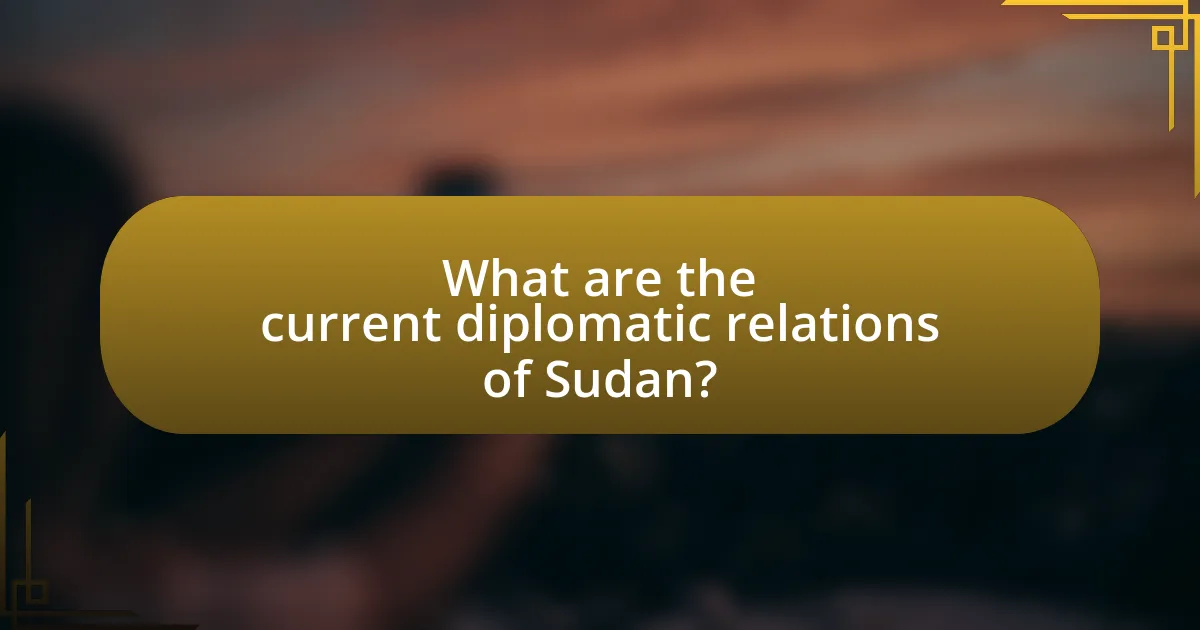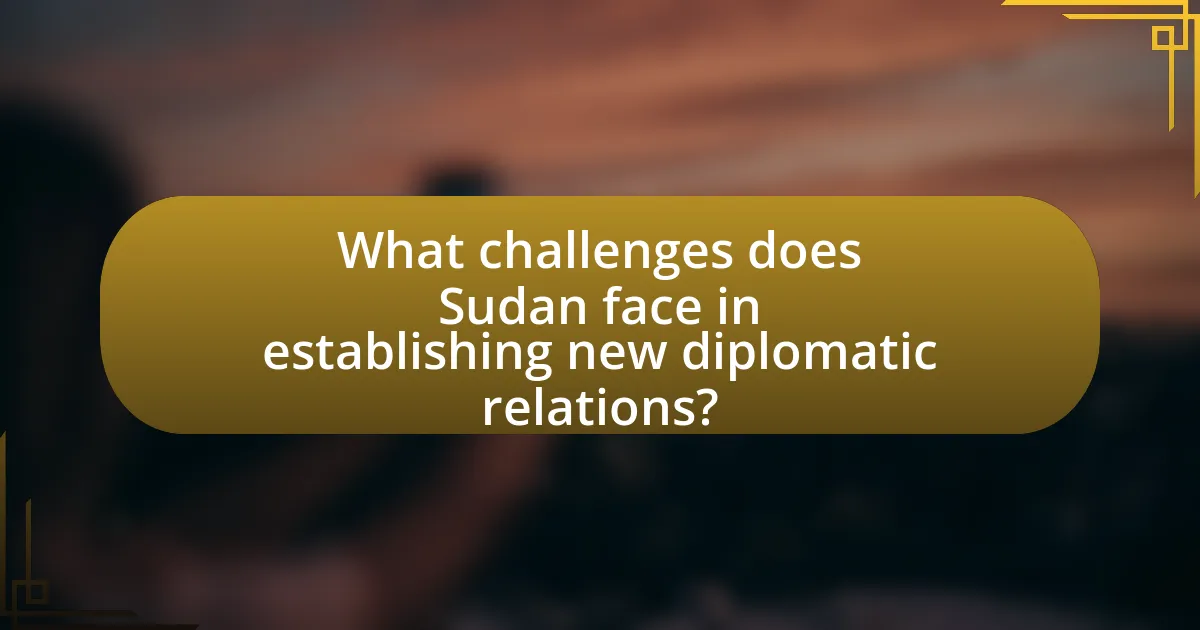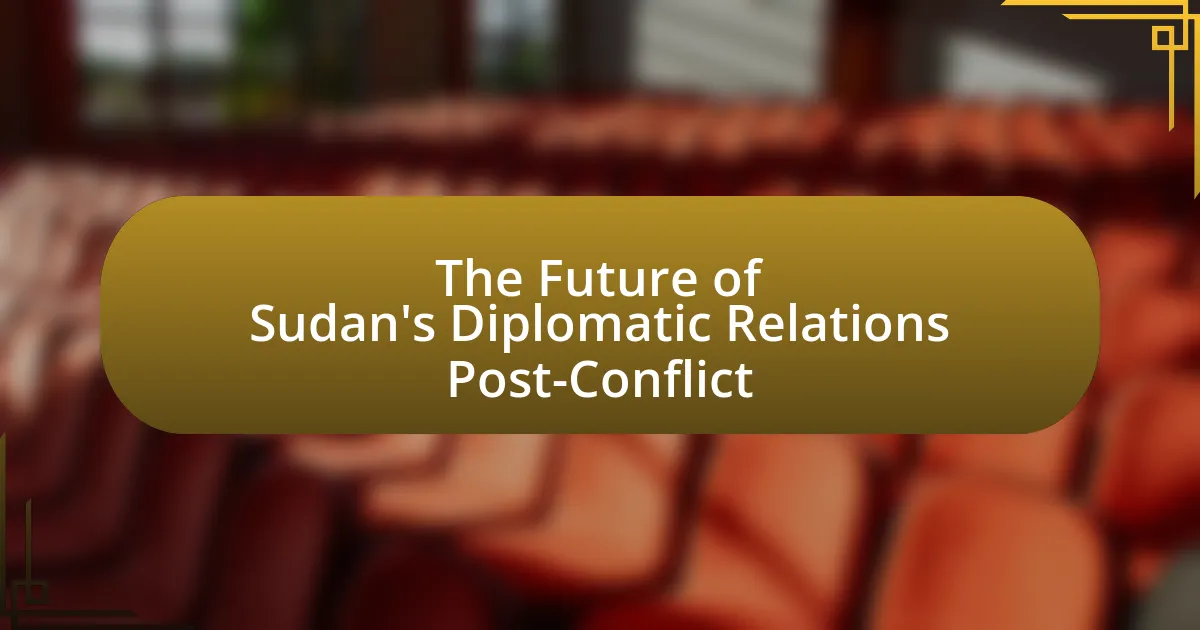The article focuses on the current state and future prospects of Sudan’s diplomatic relations in the context of post-conflict recovery. It examines Sudan’s existing relationships with countries such as Egypt, China, and Russia, while highlighting the challenges posed by internal conflicts and human rights issues that complicate ties with Western nations. Key historical events, including the Comprehensive Peace Agreement and the ousting of former President Omar al-Bashir, are discussed as pivotal moments that have shaped Sudan’s foreign policy and international standing. The article also explores the role of regional powers, the impact of economic instability, and the importance of civil society organizations in fostering diplomatic engagement, ultimately outlining strategies for Sudan to rebuild its international reputation and establish stable diplomatic relations.

What are the current diplomatic relations of Sudan?
Sudan currently maintains diplomatic relations with several countries, including Egypt, China, and Russia, while facing challenges in its relationships with Western nations due to ongoing internal conflicts and human rights concerns. The Sudanese government has been working to normalize relations with the international community, particularly after the ousting of former President Omar al-Bashir in 2019, which led to a transitional government aiming for democratic reforms. However, the recent escalation of violence and political instability has complicated these efforts, resulting in a cautious approach from many nations. For instance, the United States has expressed concerns over the humanitarian situation and has imposed sanctions, while the African Union and Arab League continue to engage with Sudan to promote stability and peace in the region.
How have historical conflicts shaped Sudan’s diplomatic landscape?
Historical conflicts have significantly shaped Sudan’s diplomatic landscape by creating a legacy of mistrust and fragmentation among various ethnic and political groups. The civil wars, particularly the Second Sudanese Civil War (1983-2005) and the Darfur conflict (2003-present), have led to international interventions and sanctions, influencing Sudan’s relationships with neighboring countries and global powers. For instance, the Comprehensive Peace Agreement in 2005, which ended the Second Civil War, facilitated South Sudan’s independence in 2011, altering Sudan’s diplomatic ties in the region. Additionally, the ongoing conflicts have prompted Sudan to seek alliances with countries like Russia and China, which have provided military and economic support, thereby reshaping its foreign policy priorities.
What key events have influenced Sudan’s international relations?
Key events that have influenced Sudan’s international relations include the signing of the Comprehensive Peace Agreement in 2005, which ended the Second Sudanese Civil War and led to South Sudan’s independence in 2011, significantly altering Sudan’s geopolitical landscape. Additionally, the Darfur conflict, which began in 2003, drew international condemnation and led to sanctions from the United States and the International Criminal Court’s indictment of former President Omar al-Bashir for war crimes, further isolating Sudan diplomatically. The 2019 ousting of al-Bashir marked a pivotal shift, opening avenues for improved relations with Western nations and the normalization of ties with Israel in 2020, reflecting a broader regional realignment. These events collectively shaped Sudan’s diplomatic engagements and its quest for international legitimacy and support.
How do internal conflicts affect Sudan’s foreign policy?
Internal conflicts significantly hinder Sudan’s foreign policy by diverting attention and resources away from international engagement. The ongoing civil strife and political instability limit the government’s ability to establish and maintain diplomatic relations, as internal priorities take precedence over foreign affairs. For instance, the conflict in Darfur and the power struggles in Khartoum have led to a focus on domestic security rather than international cooperation, resulting in strained relations with neighboring countries and international organizations. Additionally, the instability has made Sudan less attractive for foreign investment and aid, further isolating the nation on the global stage.
What role do regional powers play in Sudan’s diplomacy?
Regional powers significantly influence Sudan’s diplomacy by shaping its foreign relations and internal stability. Countries such as Egypt, Saudi Arabia, and Ethiopia engage in diplomatic efforts that aim to stabilize Sudan, often through economic support, mediation in conflicts, and political alliances. For instance, Egypt has historically sought to maintain a strong relationship with Sudan to secure its interests in the Nile River, while Saudi Arabia has provided financial aid and investment to bolster Sudan’s economy. Additionally, Ethiopia’s involvement in mediating peace talks highlights the strategic importance of regional powers in facilitating dialogue among Sudanese factions. These interactions underscore the critical role that regional powers play in navigating Sudan’s complex diplomatic landscape, especially in the aftermath of conflict.
Which countries are considered Sudan’s main allies and adversaries?
Sudan’s main allies include Egypt, China, and Russia, while its primary adversaries are South Sudan and the United States. Egypt has historically supported Sudan due to shared interests in the Nile River and regional stability. China has invested significantly in Sudan’s oil and infrastructure sectors, strengthening their bilateral ties. Russia has also engaged with Sudan through military cooperation and arms sales. Conversely, South Sudan has been an adversary due to ongoing tensions and conflicts stemming from their separation in 2011. The United States has imposed sanctions on Sudan for human rights violations and terrorism, contributing to its adversarial stance.
How do regional conflicts impact Sudan’s diplomatic strategies?
Regional conflicts significantly influence Sudan’s diplomatic strategies by compelling the nation to navigate complex alliances and rivalries. For instance, ongoing tensions in neighboring South Sudan and the Central African Republic force Sudan to engage in diplomatic balancing acts to secure its borders and maintain stability. Additionally, Sudan’s historical ties with Egypt and Ethiopia, particularly regarding the Grand Ethiopian Renaissance Dam, necessitate careful diplomatic maneuvering to address water security concerns. These regional dynamics shape Sudan’s foreign policy priorities, often leading to a focus on conflict resolution and regional cooperation initiatives to enhance its diplomatic standing and foster economic partnerships.
What are the potential pathways for Sudan’s diplomatic relations post-conflict?
Sudan’s potential pathways for diplomatic relations post-conflict include re-engagement with international organizations, bilateral agreements with neighboring countries, and fostering economic partnerships. Re-engagement with organizations such as the African Union and the United Nations can facilitate peacebuilding and development efforts, as seen in previous post-conflict scenarios where international support was crucial for stability. Bilateral agreements with neighboring countries, like Egypt and South Sudan, can enhance regional cooperation and security, reflecting historical precedents where neighboring states played pivotal roles in conflict resolution. Additionally, fostering economic partnerships, particularly in sectors like agriculture and energy, can attract foreign investment and aid, similar to the post-conflict recovery strategies employed by other nations in the region.
How can Sudan rebuild its international reputation?
Sudan can rebuild its international reputation by implementing democratic reforms, promoting human rights, and engaging in transparent governance. These actions are essential for restoring trust among the international community, as evidenced by the positive outcomes seen in other nations that have undertaken similar reforms. For instance, countries like Tunisia have improved their global standing through democratic transitions and respect for civil liberties, leading to increased foreign investment and diplomatic partnerships. Additionally, Sudan’s commitment to cooperating with international organizations and adhering to global standards can further enhance its credibility and foster stronger diplomatic relations.
What steps are necessary for Sudan to gain international recognition?
Sudan must establish a stable and inclusive government to gain international recognition. This involves transitioning from military rule to a civilian-led government that represents diverse political and social groups. Additionally, Sudan should engage in peace negotiations to resolve internal conflicts, ensuring the protection of human rights and the rule of law. Demonstrating commitment to democratic reforms and economic stability will further enhance its legitimacy. Countries and organizations, such as the African Union and the United Nations, often require these steps as prerequisites for recognition, as seen in similar cases like South Sudan’s independence in 2011, where international support was contingent on governance and peace agreements.
How can Sudan engage with international organizations effectively?
Sudan can engage with international organizations effectively by establishing clear diplomatic channels and fostering collaborative partnerships. This involves actively participating in international forums, such as the United Nations and African Union, to voice its interests and concerns. By aligning its national policies with the goals of these organizations, Sudan can enhance its credibility and attract support for development initiatives. Historical examples, such as Sudan’s involvement in peacekeeping missions under the UN, demonstrate the potential benefits of such engagement, as it can lead to increased foreign aid and investment, ultimately contributing to the country’s stability and growth.
What are the implications of peace agreements on Sudan’s foreign relations?
Peace agreements in Sudan significantly enhance the country’s foreign relations by fostering diplomatic recognition and economic partnerships. Following the signing of the Comprehensive Peace Agreement in 2005, Sudan experienced improved ties with Western nations, leading to the lifting of some sanctions and increased foreign investment. Additionally, peace agreements often facilitate Sudan’s participation in regional organizations, such as the African Union, which further solidifies its diplomatic standing. The 2020 normalization of relations with Israel exemplifies how peace initiatives can open new avenues for international cooperation and trade, thereby reshaping Sudan’s foreign relations landscape.
How do peace agreements influence Sudan’s diplomatic negotiations?
Peace agreements significantly influence Sudan’s diplomatic negotiations by establishing a framework for stability and cooperation among conflicting parties. These agreements often lead to the recognition of new political entities and the legitimization of previously marginalized groups, which can enhance Sudan’s standing in international forums. For instance, the 2020 Juba Agreement aimed to resolve conflicts with various armed groups, thereby facilitating Sudan’s re-engagement with international partners and financial institutions. This re-engagement is crucial for attracting foreign investment and aid, which are essential for Sudan’s economic recovery and development post-conflict.
What role do international mediators play in Sudan’s post-conflict diplomacy?
International mediators play a crucial role in Sudan’s post-conflict diplomacy by facilitating dialogue between conflicting parties and promoting peace agreements. These mediators, often representing international organizations or foreign governments, help to bridge gaps in communication, address grievances, and build trust among stakeholders. For instance, the African Union and the United Nations have been actively involved in mediating peace processes in Sudan, which has led to significant agreements such as the Juba Peace Agreement in 2020. This agreement aimed to resolve longstanding conflicts and included provisions for power-sharing and resource allocation, demonstrating the effectiveness of international mediation in fostering stability and cooperation in post-conflict settings.

What challenges does Sudan face in establishing new diplomatic relations?
Sudan faces significant challenges in establishing new diplomatic relations, primarily due to ongoing internal conflicts and political instability. The power struggle between military factions and civilian leaders has created an unpredictable environment, deterring potential diplomatic partners. Additionally, Sudan’s history of sanctions and international isolation, particularly following the Darfur conflict and the ousting of former President Omar al-Bashir, complicates its efforts to rebuild trust and engage with other nations. The lack of a cohesive government and the presence of armed groups further exacerbate these challenges, making it difficult for Sudan to present a stable and unified front in international relations.
How does economic instability affect Sudan’s diplomatic efforts?
Economic instability significantly hampers Sudan’s diplomatic efforts by limiting its ability to engage effectively with other nations. The country’s ongoing economic challenges, including high inflation and a depreciating currency, reduce its leverage in negotiations and diminish foreign investment prospects. For instance, Sudan’s GDP contracted by 3.1% in 2021, reflecting the adverse effects of economic turmoil on its international standing. Consequently, this instability leads to a lack of trust from potential partners, making it difficult for Sudan to secure essential support for rebuilding and development initiatives.
What economic reforms are necessary for improved diplomatic relations?
Economic reforms necessary for improved diplomatic relations include the implementation of transparent governance, the establishment of a stable currency, and the promotion of trade liberalization. Transparent governance fosters trust among international partners, as seen in countries like Rwanda, which improved its diplomatic ties through anti-corruption measures and accountability. A stable currency, as evidenced by the economic recovery in post-war Bosnia, can enhance trade relations and attract foreign investment. Trade liberalization, demonstrated by Vietnam’s reforms in the 1980s, can lead to increased economic cooperation and stronger diplomatic ties by reducing barriers to trade and encouraging mutual economic interests.
How can Sudan attract foreign investment to support its diplomacy?
Sudan can attract foreign investment to support its diplomacy by implementing economic reforms, enhancing regulatory frameworks, and fostering a stable political environment. Economic reforms, such as improving infrastructure and reducing bureaucratic barriers, can create a more favorable investment climate. For instance, the World Bank reported that countries with streamlined regulations see a significant increase in foreign direct investment. Additionally, establishing transparent governance and anti-corruption measures can build investor confidence, as evidenced by the success of nations like Rwanda, which improved its investment climate through similar strategies. By prioritizing these actions, Sudan can effectively draw foreign investment that bolsters its diplomatic efforts.
What are the social factors influencing Sudan’s diplomatic relations?
Social factors influencing Sudan’s diplomatic relations include ethnic diversity, historical grievances, and social cohesion challenges. Ethnic diversity in Sudan, comprising various groups such as Arabs and non-Arabs, often leads to tensions that affect international perceptions and alliances. Historical grievances, particularly stemming from the Darfur conflict and South Sudan’s secession, shape Sudan’s interactions with neighboring countries and international organizations. Additionally, social cohesion challenges, including economic disparities and political instability, hinder the establishment of stable diplomatic ties, as these internal issues can lead to external conflicts and influence foreign policy decisions.
How does public opinion shape Sudan’s foreign policy decisions?
Public opinion significantly influences Sudan’s foreign policy decisions by shaping the priorities and actions of its government. The Sudanese leadership often responds to public sentiment to maintain legitimacy and support, particularly in a post-conflict context where national unity is crucial. For instance, during the transitional period following the ousting of Omar al-Bashir in 2019, public demands for democratic reforms and improved international relations guided the government’s approach to foreign policy, leading to a focus on rebuilding ties with Western nations and addressing human rights concerns. This responsiveness to public opinion is evident in the government’s efforts to engage with international organizations and seek foreign investment, reflecting the populace’s aspirations for economic stability and development.
What role do civil society organizations play in Sudan’s diplomacy?
Civil society organizations play a crucial role in Sudan’s diplomacy by acting as intermediaries between the government and the populace, advocating for human rights, and promoting democratic governance. These organizations facilitate dialogue and engagement in peace processes, ensuring that diverse voices are represented in negotiations. For instance, during the peace talks following the 2019 revolution, civil society groups were instrumental in pushing for reforms and accountability, which were essential for establishing a stable diplomatic environment. Their involvement has been recognized by international bodies, highlighting their importance in fostering transparency and trust in Sudan’s diplomatic relations.
What best practices can Sudan adopt for successful diplomatic relations?
Sudan can adopt several best practices for successful diplomatic relations, including establishing clear communication channels, fostering mutual respect, and engaging in multilateral diplomacy. Clear communication channels enable Sudan to articulate its interests and concerns effectively, which is essential for building trust with other nations. Fostering mutual respect involves recognizing the sovereignty and cultural values of other countries, which can enhance cooperation and reduce tensions. Engaging in multilateral diplomacy allows Sudan to participate in international forums and organizations, facilitating collaboration on global issues such as security, trade, and humanitarian aid. These practices are supported by historical examples where countries that prioritized communication and respect achieved more stable and productive diplomatic relationships.
How can Sudan leverage technology in its diplomatic efforts?
Sudan can leverage technology in its diplomatic efforts by utilizing digital communication platforms to enhance engagement with international stakeholders. By adopting tools such as social media, video conferencing, and data analytics, Sudan can effectively disseminate its diplomatic messages, foster real-time dialogue, and analyze public sentiment. For instance, the use of social media platforms like Twitter and Facebook allows Sudan to reach a global audience, while video conferencing tools facilitate direct communication with foreign governments and organizations. Additionally, data analytics can help Sudan assess the impact of its diplomatic initiatives and tailor its strategies accordingly, as evidenced by countries that have successfully used technology to improve their diplomatic outreach and engagement.
What strategies can Sudan implement to foster international partnerships?
Sudan can implement strategies such as enhancing diplomatic engagement, promoting economic cooperation, and participating in regional organizations to foster international partnerships. By actively engaging in diplomatic dialogues with various countries, Sudan can build trust and establish mutual interests. Economic cooperation can be promoted through trade agreements and investment opportunities, particularly in sectors like agriculture and energy, which are vital for Sudan’s growth. Additionally, participating in regional organizations like the African Union and the Arab League can help Sudan align its interests with neighboring countries, facilitating collaborative efforts on security and development. These strategies are supported by Sudan’s historical context of seeking international support for economic recovery and stability following conflicts.

Leave a Reply